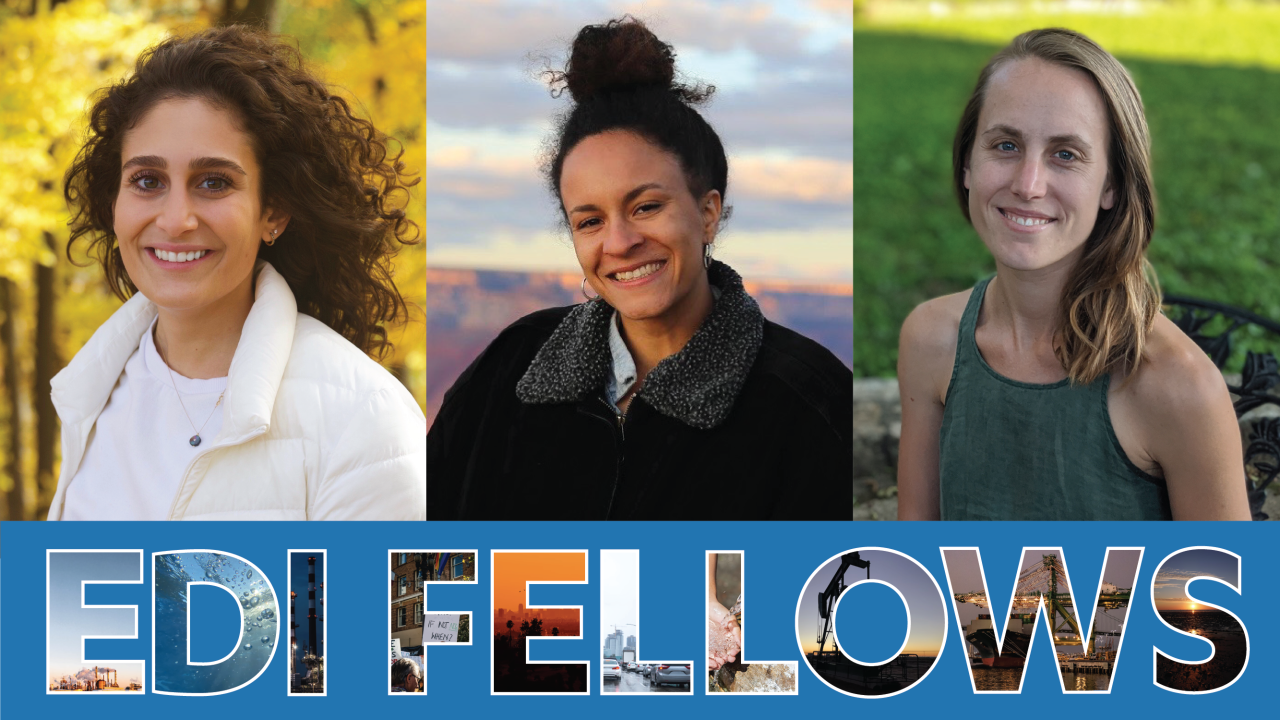In the backdrop of a tumultuous 2020 that saw life transformed by the COVID-19 pandemic and the murder of George Floyd, the UCLA Sustainable LA Grand Challenge (SLA GC) committed to placing an even greater emphasis on equity, diversity and inclusion as it relates to the initiative’s goals, and sustainability as a whole, because we can and must do better.
Part of that commitment has come to fruition in the first cohort of SLA GC Equity, Diversity and Inclusion (EDI) Fellows for the academic year 2021-22. SLA GC selected three passionate, innovative and highly motivated graduate students to work with UCLA faculty mentors in partnership with external partners to discover and co-develop sustainable interventions that center on improving equity, diversity and inclusion in the Los Angeles region.
For the graduate students chosen, the opportunity was too important to pass up, and they remain excited about the ability to research and speak up on EDI issues in sustainability, a key component of sustainability that has too often been overlooked.
“Sustainability and equity should be thought of together in policy contexts,” said Alique Berberian, one of the three inaugural SLA GC EDI fellows. “And we’re seeing this more and more. It’s reflected in L.A. County’s Sustainability Plan and L.A. City’s Green New Deal, where equity is a core component of many of the goals and targets that are outlined in these plans. I think our research as part of this fellowship contributes to providing more evidence as to why we should continue in this direction.”
Berberian is partnering with the L.A. County Chief Sustainability Office for her research, which focuses on assessing contamination risks to Angelenos’ drinking water from oil and gas wells across the county, while also examining potential racial disparities in risk.
Part of the study will research potential contributions that historic redlining — a mortgage lending policy that contributed to neighborhood and racial segregation — could have had in compounding these issues.
To Berberian, examining equity, health and sustainability issues has been her passion for years.
“As an interdisciplinary scholar — someone who is interested in science and environmental health disparities, but also in public policy — this project seemed like a really unique way to intersect the two fields, while also gaining exposure to professional opportunities in policy,” she said.
A sense of local environmental justice passion guided Danielle Hoague in becoming an SLA GC EDI Fellow. The L.A. native grew up near the polluted Arroyo Seco Canyon, informing an early desire to make a difference, and has since become a fixture in the Watts community where she fights for environmental justice.
“Everything you can imagine that’s bad is happening to Watts,” she said. “We call it pebble beach because underneath every rock there is a different issue. After speaking with residents, I became compelled to do some of the policy and science research for them, along with government affairs. The Watts residents lack political power, so I find it important as a researcher to give back and use my experience to actually put theory into practice. I don’t want to just learn ‘why,’ but to actually work to fix these problems.”
“Because of the interdisciplinary nature of my research, I was really drawn to the EDI Fellows program, and I do really care about equity and sciences, and often it is not really interwoven. I already had some community-based work, so I was like, ‘Oh, I can actually connect with people and translate their needs to what is legible.’”
Hoague’s work will help better unite the goals of L.A. Metro’s Chief Sustainability Office and Office of Equity & Race to help underserved communities. She is doing this by talking to communities in South Central L.A. about how sustainability can be integrated into those communities and how Metro can best reflect accessibility needs.
“If we can successfully make this partnership happen, where community members feel heard, then maybe the housing authority or other agencies could have a similar process, and maybe there can be more conciliatory conversations and outcomes,” Hoague said.
This opportunity for community partnership and university and professional mentorship was an enticing proposition that led SLA GC EDI Fellow Emma French to the program.
“It seemed like a really great opportunity in particular because of the connection being made with actual policymakers on the ground,” she said. “I’ve been really interested in trying to do collaborative, community-based research as much as possible, and it’s not actually as easy to do as I thought. This seemed like a really unique opportunity to get insider access to some of these processes that I’ve been looking at from the outside.”
She is working with the newly established Los Angeles Climate Emergency Mobilization Office — specifically helping the Office come up with processes to ensure that equity is central to the design and implementation of local climate policies and plans. Much like her fellow, well, fellows, French is excited to get to work in this burgeoning space, and begin to chip away at the issues she is most passionate about.
“I think this is really important, given that, historically, equity in sustainability often receives little attention,” she said. “We have to consider social equity and environmental equity first if we want to prioritize those goals and outcomes. And I think the fact that research groups and funders are recognizing that and prioritizing that through the creation of fellowships like the SLA GC EDI Fellows Program is really important.”





